For healthtech startups in Singapore, Germany is an increasingly attractive prospect with many market opportunities. Home to 83 million people and boasting 2,000 hospitals, including around 30 German university hospitals, plus over 100 health insurance companies, Germany benefits from a strong healthcare system. Employing over 400,000 healthcare professionals across the country, approximately one out of six jobs in Germany is linked to the healthcare sector.
Health insurance in Germany is compulsory, with 90% of German residents covered by statutory health insurance and 10% opting for private insurers. This means there are low levels of out-of-pocket payments for healthcare, making it important for companies who are considering overseas expansion into Germany to have a comprehensive understanding of Germany’s reimbursement landscape and pathways from the get-go.
Mature healthcare market
Germany is the third-largest medical technology market in the world after the United States and Japan, and is the largest European market, with a medical device sector accounting for 10.2% of global medical tech production after the U.S. (39.6%) and China (11.1%).
The country is a global hub of market opportunities for medical biotech. Backed by world-class research infrastructure and strong collaboration across government, industry, and researchers, large corporates and startups alike, Germany is driving growth across its life science sector, particularly in areas such as biopharmaceuticals and in-vitro diagnostics.
And its reputation for innovation does not stop there. Megalith brands like Siemens, Braun, Fresenius, and others have played a major role in giving Germany its reputation for producing innovative, high-quality medical equipment, spanning diagnostic imaging, medical and dental instruments, and optical technologies. What is less commonly known is that the majority of firms powering this sector are what’s known as Mittelstand companies – small-to-medium-sized enterprises, who are global leaders in their own respective niche and keen to embrace new innovation, which spells good news for Singapore startups that are starting a business in Germany.
Germany’s digital healthcare transformation
There are currently 1,400 healthcare and life sciences startups based across Germany, spanning MedTech, BioTech, and Digital Health. This number is expected to grow, following the introduction of Germany’s Digital Care Act in December 2019, which is accelerating efforts to digitise and innovate the market, with the goal of making digital solutions a core part of the country’s federal healthcare system.
And though Germany’s healthcare system has for many years been slow to digitise, the new Act means it is now leading by example in digital patient-oriented healthcare globally. It is the first country to allow physicians to prescribe low-risk digital health apps to patients while also moving to digitise everything from prescriptions to patient communications.
More recently, in September 2020, Germany introduced its Hospital Future Act, which aims to strengthen the country’s hospital system, allocating €4.3 billion in funding for German hospitals to invest in digitisation and automation initiatives such as patient portals, digital medication management, robotic systems, and high-tech medical equipment. This presents new market opportunities for startups in the healthcare sector.
Key Trends You Need To Know:
- Germany has become the first country in the world to allow doctors to prescribe low-risk healthcare apps to patients, which are available on prescription and paid-for by statutory health insurance.
- Video consultations are becoming commonplace and healthcare professionals can promote their telehealth services to patients, proving particularly useful during the COVID-19 pandemic.
- Electronic patient records are now mandatory, and will be made available to all members of public health insurance by 2021. E-prescriptions and patient communications, i.e., medical leave certificates will also move to digital.
- German statutory and private health insurance companies are becoming VC fund partners, creating new market entry and financing opportunities for digital health startups.
- The German government will receive anonymised member demographics and health data from German public health insurance companies, which will be accessible to research organisations and universities for research purposes.
This is good news for later-stage startup Biorithm, one of the innovative Singapore startups which took part in Scaler8’s market expansion strategy programme to Germany earlier this year.
“Germany’s digital health scene is growing – with the introduction of new laws helping to move the country in the right direction in terms of enabling adoption of digital health technologies across the country,” said its co-founder and CEO, Amrish Nair.
Established some 5 years ago as a spin-off from Singapore’s Nanyang Technological University, Biorithm aims to disrupt maternal-fetal medicine to improve pregnancy outcomes globally. The firm was able to identify market opportunities in the sector, and produced’s wearable devices that enables continuous and automated monitoring of fetal and maternal heart rates to identify early signs of distress, to allow for timely intervention while reducing the cost of care.
According to Amrish, Germany’s conservative mindset around adopting digital health technologies has changed significantly since the coronavirus pandemic. “Pre-COVID-19, a lot of doctors had a very traditional mindset, which stemmed from patient safety. Now, huge mental barriers towards digital health and telemedicine have been overcome – we’re seeing more progress in this area in a matter of months than over the past 50 years! This was always our biggest challenge in the market – trying to convince physicians of the multilateral benefits of our solution – firstly for the patients, but also for their practice, by helping to improve medical outcomes while reducing costs.”
Strong legal and regulatory framework
Even with demand for telemedicine and other digital health solutions during the pandemic helping to create market opportunities for for Germany’s medtech sector, the country is still very much an evidence-based mature market, with a strong legal and regulatory framework, which makes successful entry no easy feat. And while this presents its own challenges, for startups like Singapore-headquartered diagnostic imaging solutions company, TeleMedC, it’s a plus.
“We wanted to take the regulatory pathway for our product, and felt that when the hurdles are higher like they are in Germany, getting into the market early and being confident that our product and academic credentials can live up to these standards, is going to secure us a bigger market share,” said TeleMedC chief medical officer, Dr. Teck Jack Tan, who also participated in the Scaler8 programme.
TeleMedC, which provides AI-powered diagnostic solutions for point-of-care screening and virtual management of eye diseases, is currently going through the process of validation and market access processes in Germany, working with one of the country’s largest hospitals.
“Germany is an old market which requires an extra level of validation for products to make the cut”, said Para Segaram, the company’s CEO. “Even if you have a CE Mark, organisations want to see real-life evidence that the product will make a positive difference to the medical outcome. Only then can they confirm that it’s good enough for the whole of Germany. This is what we are currently working on achieving. Once we have this, it’s possible the hospital will sponsor our pilot throughout Germany. It’s challenging, but we like the challenge. Without this validation, it would be very difficult to get a foot-in-the-door.”
Germany’s sphere of influence
For Biorithm, TeleMedC, and many other Singapore digital health startups, Germany stands as an attractive base in Europe with many market opportunities, boasting a central geographical location with influential ties to surrounding European countries.
“Whenever we go into a market, we always aim to engage with clinical key opinion leaders first. Germany has a significant number of very well known institutions and clinical key opinion leaders across Europe. That’s one of the most important things for us. Germany has that ability to influence markets in Europe and across the world,” said Biorithm CEO, Amrish Nair.
Germany is often a good starting point for international healthtech startups looking at business expansion in the European market, with TeleMedC CEO Para Segaram acknowledging that “Germany is not an easy market, but if you go into Germany, the rest of Europe is much easier.”
A warm welcome and no-nonsense business culture
Both Biorithm and TeleMedC report receiving a warm welcome since beginning their market access journeys to enter the German market.
“Institutional organisations and researchers were and continue to be very friendly, and they’re excited to work with overseas partners,” said TeleMedC CMO, Dr. Teck Jack Tan. “It’s a no-nonsense business culture, which is refreshing. Once we are in – we are here to stay. This is a long-term play for us and we are keen to build long-term relationships with partners in Germany. In fact, we are already in the process of registering our TeleMedC GmbH company,” he added.
Germany’s straight-talking and uber-efficient business culture is an attractive feature of the market, and reciprocating this business approach can make the process even more seamless opening up even more market opportunities. This is easier when working with a partner, which can help overcome any communication or cultural differences that may exist.
The importance of having an in-market partner
Aside from business culture, the German market has other differences that may be daunting for entrepreneurs from Singapore. “Many documents are not in English, it’s a very large country and points of contact can be hard to reach, and there are also cultural differences between regions. It’s important to have help to manoeuvre through that,” said Biorithm CEO Amrish Nair.
Having a trustworthy local partner to help make initial introductions has been invaluable for Biorithm. “Although a high percentage of Germans in the medical profession speak good English, a good partner can help you to localise your solution while also helping to promote you in a local context. Scaler8 really helped us with this – setting up targeted meetings for us to make valuable connections with the right people. We’ve spoken to clinical experts, tech entrepreneurs, mentors, advisors, and angel investors; we’re using these networks to explore concrete ways for us to enter the German market,” he added.
At Scaler8, we seek to provide Singapore companies with the best toolkit and resources to venture into the German market and thrive. If you are keen to find out more about how we can support your business expansion plans, do get in touch to schedule a 1-on-1 market advisory session for your company.
Applications are open year-round for Scaler8 Explore and Scaler8 Access. Visit this page for more information.




